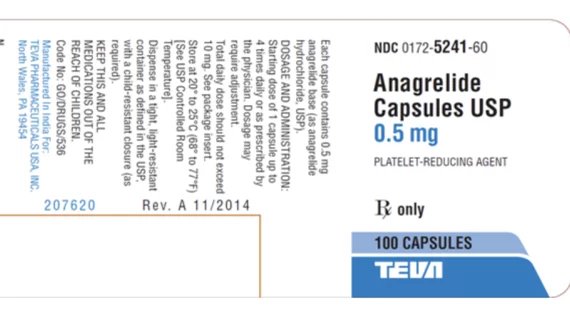FDA announces recall of platelet-reducing medication due to risk of clotting or other adverse cardiovascular outcomes
Teva Pharmaceuticals USA, a New Jersey-based healthcare company focused on the development and distribution of generic medications, has recalled a single lot of its anagrelide capsules due to a failed dissolution test.
Anagrelide is a platelet-reducing agent indicated for the treatment of thrombocythemia. It lowers the patient’s risk of thrombosis and can limit the impact of certain symptoms related to thrombo-hemorrhagic events.
This is a voluntary recall. No complaints or adverse events have been reported thus far, but the failed dissolution test does mean patients could face certain risks if they took any of the impacted capsules.
“Administration of this product with lower dissolution — taking longer to dissolve once ingested — may result in decreased effectiveness or ineffectiveness of the drug to exert its platelet-reducing effect,” according to an advisory from the U.S. Food and Drug Administration (FDA). “Failed dissolution can result in a slower rate and extent of drug release leading to less anagrelide available in the body. For seriously ill patients with elevated platelet counts, less available anagrelide in the body could increase the risk of clotting, and coagulation or bleeding events such as a heart attack or stroke, which could be life threatening.”
The single lot included in this recall was distributed from July 2020 to September 2020. Each bottle is packaged with 100 capsules, and each capsule includes a dose of 0.5 mg.
Teva has alerted all customers about the recall. The company is asking that all impacted products be returned.
Related Content on FDA Recalls in Cardiology:
Medtronic recalls more than 6,000 catheters due to potential damage, loss of sterility
FDA announces another recall of common hypertension medication due to potential cancer risk
Congress investigating FDA over heart device recall, says agency ‘failed to protect consumers’
FDA announces new insulin recall due to potential labeling issue
FDA announces recall of hypertension medications due to potential cancer risk

